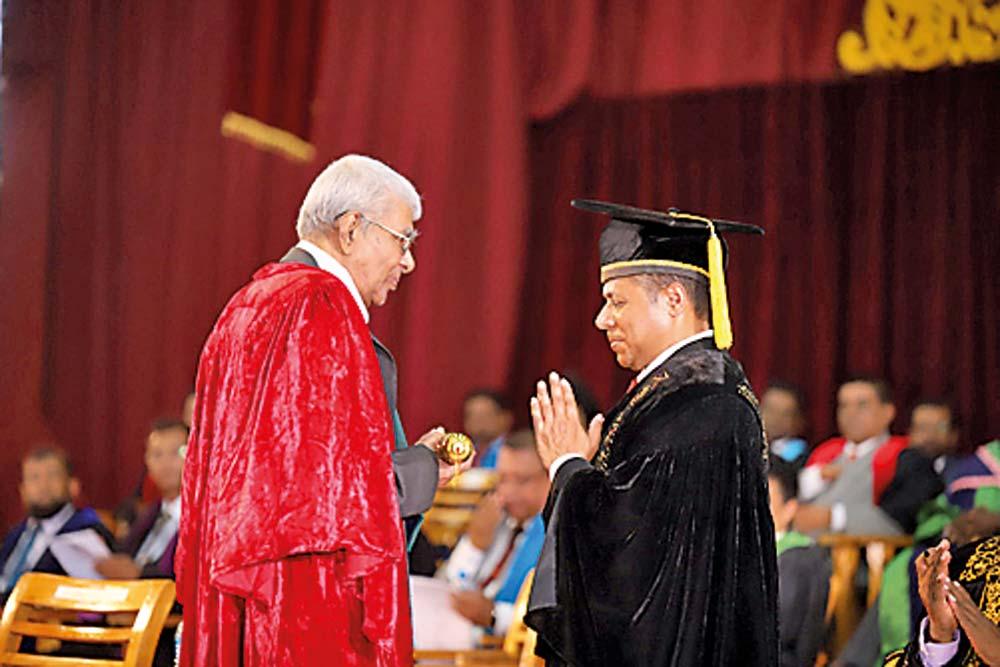Reply To:
Name - Reply Comment

Vice Chancellor Prof. Terrance Muthajith (right) presents the Honorary Degree of Doctor of Science to Prof. Munidasa Padmasiri Ranaweera
 Prof. Emeritus Munidasa Padmasiri Ranaweera was honoured by the University of Peradeniya recently for his efforts to preserve the octagonal structure which adorns the Kandy Sacred Tooth Relic Temple.
Prof. Emeritus Munidasa Padmasiri Ranaweera was honoured by the University of Peradeniya recently for his efforts to preserve the octagonal structure which adorns the Kandy Sacred Tooth Relic Temple.
The structure was built by Mulachariya Devendra a local architect during the reign of King Sri Wickrama Rajasinha.
Prof. Ranaweera was presented an Honourary Degree of Doctor of Science by the University of Peradeniya at the convocation held a few weeks ago at the University Gymnasium.
|
The picture shows the drawing of the octagonal structure which adorns the Kandy Sacred Tooth Relic Temple |
Prof. Ranaweera is also credited for setting up the first CAD Laboratory at the ME Department of the University of Illinois at Urban Champaign USA.
Prof. Ranaweera had his early education at the Udamitta BTS School and at St: Mary’s College Veyangoda before entering Ananda College, Colombo in 1954. He entered the University of Cambridge (Churchill College) for his doctoral studies in structural engineering and mechanics.
Prof. Ranaweera was a visiting professor of Mechanical Engineering at the University of Urban - Champaign (UIUC).
In 1981 he returned to the University of Peradeniya and was appointed to the chair of civil engineering and became the head in 1985. In 1989 he was elected as the Dean and then re-elected for a second term as Dean.
After his retirement in 2008 he worked at the Washington State University for a few years and returned to his motherland in 2013 and worked at the Institute of Information Technology in Malabe till the end of 2022.
Prof. Ranaweera is a member of the America Society of Mechanical Engineering and a Fellow of the Institute of Engineers in Sri Lanka.
Dean of the Faculty of Engineering Dr. U.L. Dissanayake said “The contribution to engineering, engineering education and research has been exemplary and he proposed the Honourary Doctor of Science Degree in recognition of Prof. Ranaweera’s outstanding contribution to the University of Peradeniya and to the country.
“Credit should go to Prof. Ranaweera for helping preserve the “Pattrippuwa”. Pro. Ranaweera should have been recognized the State long ago,” Prof. Dissanayake said.
Had it not been for Prof. Ranaweera, the Octagon or the “Pathiruppuwa of the Sacred Tooth Relic designed and built by royal artificer of the Kandyan Kingdom Devendra Mulachari would have been rebuilt but not to the original design as it has been and even now seen.
Original design
The original design to construct a large building came from Dhigama Nilame who was only second to Ehelepola and Molligoda.
Dehigama Nilame suggested to King Sri Wickrama Rajasinghe that the king should have a place to view the city.
The word “Pathirrippuwa” is derived from the Tamil word “Pathu”(see) combined with “ Irrupu” (seated) that was how this magnificent building made Kandy a remarkable landmark for the world.
With the terrorist attack on the Sacred Tooth Relic in 1998 the “Pathirrippuwa” or the Octagon was in a bad state needing immediate reconstruction.
Former Diyawadana Nilame Neranjan Wijeyaratne was against demolishing the building. He perhaps knew that a new building could never be done as the original one.
The Diyawadana Nilame sought the help of the University of Peradeniya which directed the project to Prof. Ranaweera, a civil engineer.
According to Prof. Ranweera the octagon is a ‘Gem in the Kandyan Architecture.’
King Sri Wickrama Rajasignhe wanted to spend his leisure time in the Pattiruppuwa to watch martial arts, sword fights and other sports activities.
The land Maha Maluwa in front of the Pattiruppuwa was gifted to the Sri Dalada Maligawa by former Prime Minister Dudley Senanayake and by Sirimavo Bandranaike.
Former Diyawadana Nilame Neranjan Wijeyaratne initiated the setting up of the “Sri Dalada Maligawa Restoration Fund” through the Buddhist Commissioner maintaining that the government of the day did not allocate any funds for the restoration. The main rehabilitation work was undertaken by the State Engineering Corporation with the armed services together with the Sri Lanka Ports Authority (SLPA). The reconstruction of the Maligawa complex was undertaken by the State Engineering Corporation and Prof. Ranaweera was tasked with assessing the damage to the structure and formulating remedial measures.
Prof. of Engineering of the University of Cambridge J. Heymen who studied the Ely Cathedral in the UK and many ancient masonry structures has laid down the principles governing their restoration. According to Prof. Ranaweera, Prof. Heyman has found that in many ancient masonry structures, there is an element of fortification perhaps as a precaution against explosions.
The ‘Pattirippuwa’ needed a roof and only ‘cosmetic ‘ repairs for the structure below level 2, according to Prof. Ranaweera.
The analysis of this assessment was done by the Computer Aided Design (CAD) Laboratory of the Department of Civil Engineering of the Faculty. He also added that in order to determine the behaviour of the structure, a three dimension finite element model of the whole structure was made using “shell and frame elements.” Also immediately after the blast the cracked structures had become stable and no further cracking or displacement has been noticed.